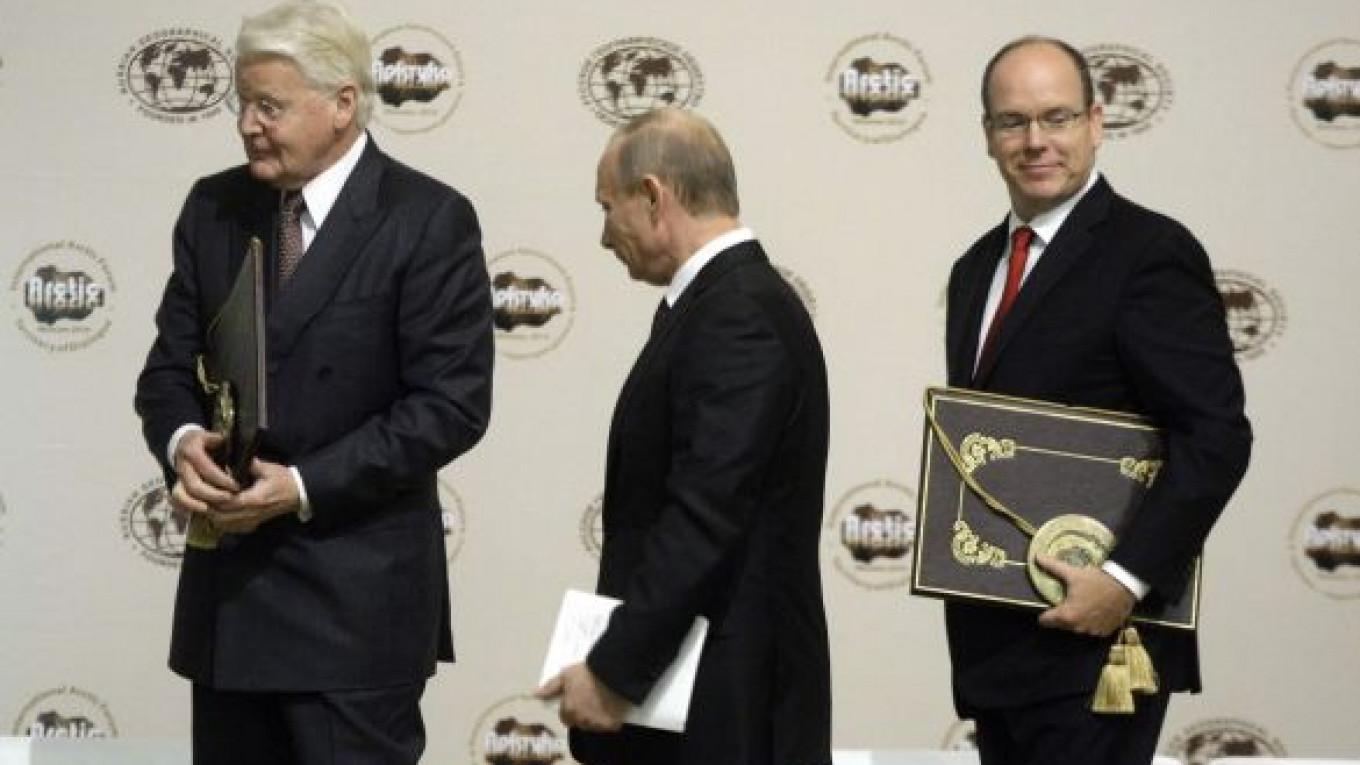The Arctic region has a bright and peaceful future with a growing Russian presence, Prime Minister Vladimir Putin said Thursday at an international conference on the Arctic.
But Russia is planning to assert its influence in the area through steady talks, Putin said, dismissing the possibility of a “battle” over its resources.
"Russia plans to restore and increase its scientific presence in the Arctic and support fundamental research, including research led by international teams of scientists and experts," Putin told an audience of 400 scientists, businessmen, lawyers and politicians gathered in Moscow for the last day of the two-day conference.
The Arctic conference — hosted by the Russian Geographical Society — is the first of its kind in Russia, which hopes that it will become a regular event. Politics were treated gently, as social and ecological issues took the foreground. Prince Albert II of Monaco was among the speakers addressing the concerns of native peoples in the region, and Icelandic President Olafur Ragnar Grimsson called the Arctic "a laboratory for international cooperation."
Putin stressed the need for peaceful resolution of conflicting national interests, based on international law.
"There are no real grounds for the majority of frightening scenarios in the Arctic," he said, and no "battle for the Arctic." Instead, he painted a contrasting picture of international cooperation amid large-scale energy production and shipping.
The Russian prime minister also promised that safeguarding the environment would be a "principle position" in industrial expansion in the region and that the government would create new national parks and reserves.
"The price of the Arctic is much higher than, say, billions of barrels of oil and gas," he said. "If we do not act responsibly in the Arctic today, we will get global problems instead of global advantages tomorrow."
"I have supported, support and will support anything that could minimize humanity's negative effect on climate change and nature," he said further.
"The Russian sector of the Arctic, where 1.5 percent of the Russian population lives, provides about 11 percent of the country's national product and 22 percent of total Russian exports," Alexander Bedritsky, President Dmitry Medvedev's adviser on climate change, said at the conference.
Political issues lurked close to the surface, however. In a run-up to the conference, Russia and Norway settled a 40-year-old dispute over their maritime border on Sept. 15. At a joint news conference with Norwegian Prime Minister Jens Stoltenberg, President Dmitry Medvedev warned that "the Arctic can do without NATO, since it is a zone of economic cooperation." The region is subject to competing territorial claims by Russia and NATO members Canada and Denmark. Iceland, Norway, Sweden, Finland and the United States also share the area.
Canada and Denmark are disputing Russia's claim to the underwater Lomonosov Ridge, a tremendous swath of the Arctic Ocean, most of which is in neutral waters. In accordance with the 1982 UN Convention on the Law of the Sea, a country can claim rights to resources in waters outside the established range of 200 miles (320 kilometers) from its territorial waters if it can show that its continental shelf extends beyond that point. All three countries are making cases for associating the ridge with their landmasses. Denmark's claim is connected with Greenland, which is a Danish territory.
The United Nations will settle the competing claims. Russia filed a claim to the territory with the UN in 2001, but it was rejected as scientifically unsupported. Russia is preparing a new claim, which will be ready in 2012 or 2013. Moscow has also earmarked $64 million for research in the next three years to support its claim. Canada will also file a claim by then, and Denmark expects to have its claim ready by 2014.
The United States is not a signatory to the 1982 convention and favors the "internationalization" of Arctic waters.
The stakes are high for all the countries. The Arctic holds almost a quarter of the world's energy reserves, in the form of oil and natural gas. Precious metals are also present under Arctic waters. Climate change will make extraction of those resources much easier in the future and open the area up to shipping.
Russia symbolically supported its claim to the Arctic in 2007, when an expedition led by explorer and State Duma member Artur Chilingarov planted a Russian flag in the seabed at the North Pole.
A Message from The Moscow Times:
Dear readers,
We are facing unprecedented challenges. Russia's Prosecutor General's Office has designated The Moscow Times as an "undesirable" organization, criminalizing our work and putting our staff at risk of prosecution. This follows our earlier unjust labeling as a "foreign agent."
These actions are direct attempts to silence independent journalism in Russia. The authorities claim our work "discredits the decisions of the Russian leadership." We see things differently: we strive to provide accurate, unbiased reporting on Russia.
We, the journalists of The Moscow Times, refuse to be silenced. But to continue our work, we need your help.
Your support, no matter how small, makes a world of difference. If you can, please support us monthly starting from just $2. It's quick to set up, and every contribution makes a significant impact.
By supporting The Moscow Times, you're defending open, independent journalism in the face of repression. Thank you for standing with us.
Remind me later.


